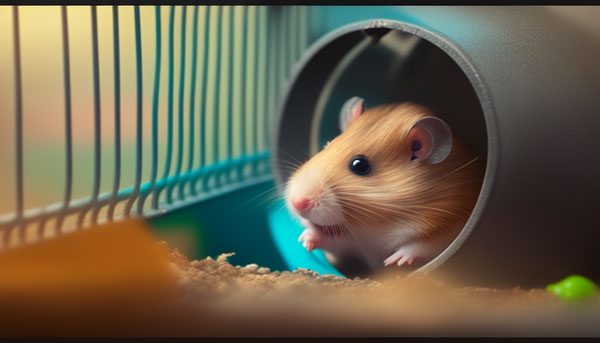A Complete Guide To Hamster Diarrhea: What Does It Look Like?
Hamster diarrhea is a potentially alarming sign for pet owners. Numerous things, including dietary changes and underlying medical conditions, can contribute to this digestive issue. It’s critical to detect diarrhea symptoms and get veterinarian help if required.
But, “What does Hamster Diarrhea look like?”- A hamster suffering from diarrhea has frequent, loose, and watery feces. Food, bacteria, stress, and parasites can cause diarrhea. In terms of appearance, hamster diarrhea is generally softer, yellowish-green in color, and runnier than a hamster’s typically solid poop.
In this article, we’ll give details on the signs of hamster diarrhea and prevention advice if you’re new to pet care.
What To Expect When A Hamster Has Diarrhea: What would it look like?
Hamsters are used to living in the wilderness. As a result, they do not exhibit early and obvious signs of illness. Diarrhea must be severe if it persists for more than 48 hours.

When a hamster has diarrhea, you can expect to see the following:
- Stools that are frequent, soft, and watery: A change in the frequency and consistency of a hamster’s stools can indicate diarrhea.
- Variations in Color: Depending on the underlying cause, hamster diarrhea can take on a variety of colors, from pale brown to yellowish-green.
- Disturbing Smell: Unlike a hamster’s normal, solid poo, diarrhea might have an unpleasant odor.
- Dehydration: Diarrhea can quickly lead to dehydration, which results in sunken eyes, hunching and inactive behavior.
- Abdominal Discomfort: Some hamsters may whine or act restless when they experience abdominal pain.
- Inactivity: When a hamster suffers from diarrhea, it can feel weak, uncomfortable, and fatigued. This can lead to a decrease in physical activity.
- Restlessness: Restlessness can occur because the hamster is uncomfortable and trying to relieve the discomfort caused by diarrhea.
- Loss of appetite: A hamster will refuse to eat and slowly lose its appetite.
- Excessive intake of liquids: Your hamster will become more thirsty than usual and exhibit signs of dehydration.
- Other signs: Signs of malnutrition, hair loss, and weight loss will appear.
What Might Cause Your Pet Hamster To Get Diarrhea?
There are different reasons which can cause a hamster to suffer from diarrhea. The causes are-

1. Feeding a lot of green vegetables
A hamster’s digestive tract might become out of balance if it consumes too many green vegetables and fruits since they can be high in sugar, fiber, and moisture.
The following macronutrients should be regularly included in a hamster’s diet in the recommended amounts:
| Nutrients | Protein | Fibre | Fat |
| Recommended percentage | 12-20% | 10-15% | 3-6% |
It’s crucial to feed hamsters a balanced diet that includes a limited amount of fresh vegetables and fruits, dry food, water (30 ml/day), and seed mixes (12-15 grams).
2. Bacterial infections
Bacterial infections can cause diarrhea in hamsters. When bacteria like Salmonella or E. coli enter the gut, they can interfere with regular digestion and create inflammation, which can result in symptoms like diarrhea. Hamsters can get Wet tail, a severe type of diarrhea caused by stress and bacterial infection.
3. Stress or anxiety
Stress may also cause hamsters to suffer from diarrhea. Hamsters frequently experience stress due to environmental changes, the addition of new animals or people, loud noises, and physical handling. So, it is important to provide them with a quiet environment and to handle them gently.
4. Intestinal Parasites-
Hamsters can develop diarrhea from intestinal parasites like pinworms and tapeworms because they infect the digestive tract and prevent the absorption of nutrients. The presence of these parasites causes intestinal lining damage, irritation, and inflammation, which results in diarrhea and other digestive symptoms.
What Steps Should You Take To Prevent Diarrhea In Hamsters?
To prevent diarrhea in hamsters, you can follow these steps:

- Provide a balanced diet: Feed your hamster a balanced diet that includes a mixture of high-quality hamster food, fresh vegetables, and occasional fruits. To give their digestive system time to adjust, introduce new foods gradually.
- Keep the cage clean: To lower the risk of bacterial infections, clean the cage, water pot, and food bowl frequently and provide fresh water daily.
- Reduce stress: Give your hamster a steady, peaceful environment and handle it carefully to reduce tension.
- Avoid overfeeding: Overfeeding your hamster, particularly with high-fat meals, can cause gut problems.
- Practice good hygiene: Maintain good hygiene by washing your hands with soap both before and after handling your hamster to lower the possibility of transferring bacteria or parasites.
- Consult a vet: If your hamster shows signs of diarrhea, consult a veterinarian for a proper diagnosis and treatment plan. Some causes of diarrhea can be serious and require prompt treatment.
If you wish to examine your hamster’s health but are unsure of what signs to look for, watching this YouTube video will be helpful.
When Should You Visit A Vet For Hamster Diarrhea?
It’s important to remember that hamsters can become sick quickly, and their condition can decline rapidly. If your hamster shows any symptoms of illness, it is recommended to get veterinarian care as soon as possible.

You should see a veterinarian for your hamster’s diarrhea if:
- Diarrhea persists for more than 24 hours.
- Your hamster may develop signs of dehydration, such as droopy eyes, a dry mouth, and skin that doesn’t bounce back when pinched.
- Other symptoms, such as loss of appetite, tiredness, or abdominal pain, accompany diarrhea.
- You suspect your hamster may suffer from a more severe underlying condition, such as Wet tail or Tyzzer’s disease.
FAQs
Below are frequently asked questions to give more information about hamster diarrhea.
Q: How to keep your hamster clean when it has diarrhea?
It’s crucial to keep your hamster in a sterile environment if it gets diarrhea.Remember to routinely change your hamster’s bedding, especially if it becomes soiled with diarrhea. Clean your hamster’s cage, water bottle, and food bowl with warm water, liquid soap, and a dish towel.
Q: How long does it take for hamster diarrhea to go away?
The duration of hamster diarrhea can vary, depending on the underlying cause. A simple diet change can remedy the problem in two days if the diarrhea is brought on by eating too many green vegetables or fatty foods. Diarrhea may last several days if the cause is a more serious medical condition, like a bacterial infection.
Final Words
Hamsters can show signs of diarrhea in various ways, such as frequent loose stools, mucus-filled excrement, and variations in the color or consistency of the feces. It is important to seek veterinary advice if your hamster develops any of these symptoms so that proper care can be given.
Keep your hamster in a calm and clean environment if it has diarrhea, avoid giving it fresh leafy vegetables, and make sure to keep it well-hydrated.
Your hamster will recover quickly and remain healthy if you seek treatment and diagnose problems early.




